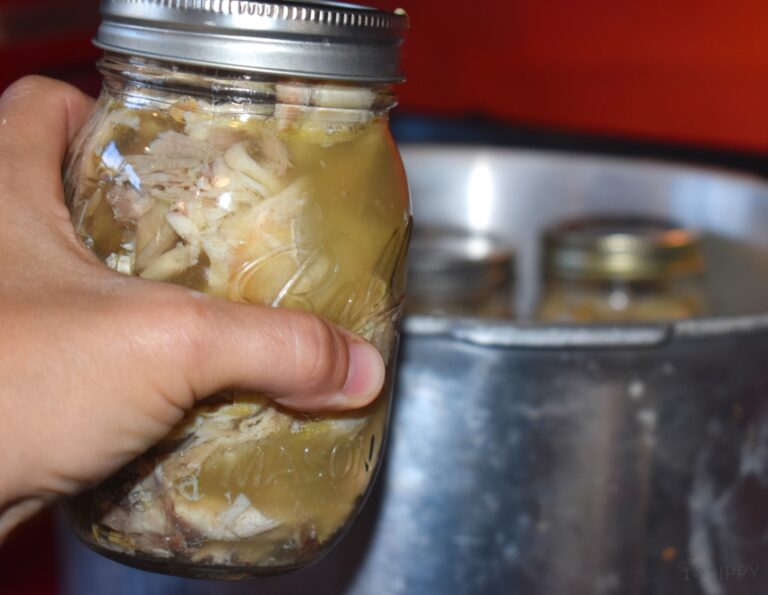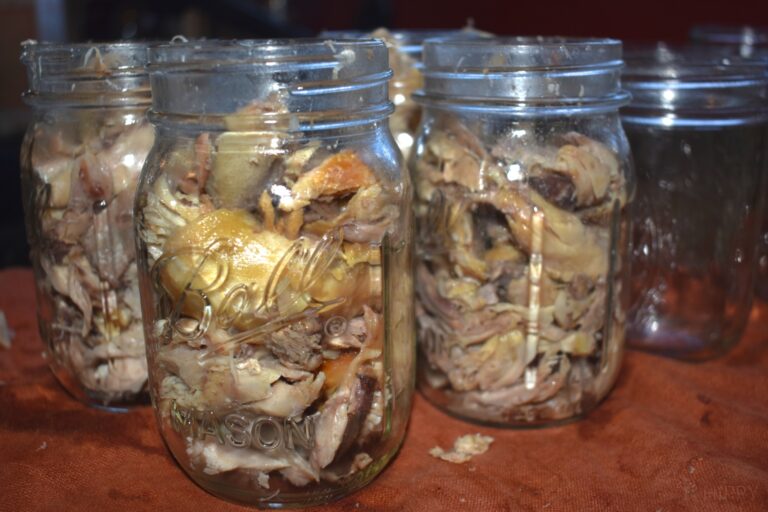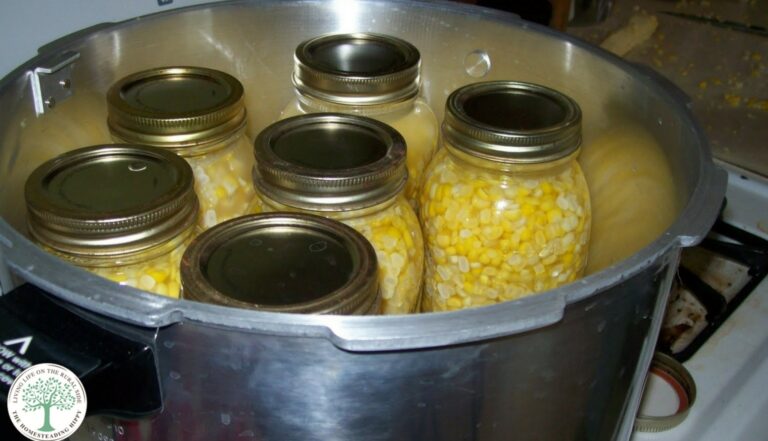Home canning is a practice that was once upon a time far more popular than it is today. Compared to being something of a niche skill, it really was a common activity in many kitchens, and one of the only reliable ways to preserve food.

But thanks to the proliferation of efficient, inexpensive, and safe food production techniques you can get canned food for pennies at virtually any supermarket today. This begs the question: is home canning really worth it anymore?
Yes and no… Economically, home canning will not save you much money. However, it makes you less dependent on modern supply chains, and is one of the few ways that you can effectively preserve your harvest yourself.
Canning is mostly a hobby for people who want to keep older skills alive or who just want to try and hang on to the literal fruits of their labors for as long as possible.
Believe me, if you have ever suggested that they just get their fruits and veggies from the grocery store like everyone else they have probably given you an earful.
It is a subject that people are passionate about, but if you are looking at it in strictly utilitarian terms, there is a lot more to consider. We will look at all of those factors in the rest of this article.
Why Home Can at All?
In our era of ultra-convenience and seemingly infinite choices at the grocery, why would anyone still go through the motions of canning their own food at home?
The primary reason to can at home is no longer economic…
In the past, it was often cheaper to can your own food than it was to buy it from the store. This is no longer the case in most developed countries.
Much of the traditional wisdom behind canning no longer holds up even after a cursory examination of the factors involved. It is often touted as a way to save money, but is it really?
Food production and distribution have become so efficient that you can now get very good canned fruits, vegetables, and even meat for pennies on the dollar compared to what it would cost you to do it yourself.
And another thing, canning is no longer the only way to preserve food effectively.
Freezing and refrigeration are both easier methods of food preservation that will keep your food safe for months or even years in most cases, and do so cost-effectively.
So if canning is more expensive and more difficult than other methods, why do people still do it at all? Are there valid practical reasons or is this all just hobby related?
Can Home Canning Really Save You Money?
If you’re looking to save money by canning your own food, you will likely be disappointed.
The cost of the equipment needed for canning, combined with the time required, means that you would have to process and preserve an immensely large quantity of food to make it worth your while financially.
Even then, the savings would be marginal compared to just buying most canned food from the store.

Let’s look at the upfront costs. A 12 pack of 16oz Ball-brand mason jars will run you anywhere from $11 to $13 on average.
They include the bands, which are re-useable for a time, and lids, which are not reusable. Bands usually sell for around $0.50 and lids anywhere from a dime to perhaps $0.40.
Your pressure canner machine will set you back anywhere from $130 to $350 depending on brand, features, and options.
Upfront, you are looking at about $175 let’s say, on the low side, to get started if you are buying new. That will buy you a lot of canned veggies.
Of course, every time you can reuse a component over the years (jars, bands, machine) you recoup more of your investment.
Lids cannot be reused but they are quite cheap, though an ongoing cost along with electricity and your time.
This does not take into account the costs of planting, feeding, watering, protecting, and nurturing your crops, all of which entail a significant investment of time and resources.
Given enough years of canning, or if you usually eat tons of canned fruit and veggies anyway, you can indeed save a significant amount over your usual store-bought stuff.
But this will not be savings you are really going to “feel” right away.
The only way home canning would realistically save you money upfront is if you are already growing your own food on the regular and have an abundant harvest.
If you grew enough to sell some of it, then the preserves you made from the surplus could be a modest source of income.
But for the average person, canning is not going to make economic sense, not right away.
Perhaps one exception would be if you were only buying high-quality organic stuff from the grocery.
These canned goods often command a significant premium, and by canning your own homegrown, high-quality crops yourself you might save a little bit upfront.
But even in this case, it is unlikely that you would save more than a dollar or so when you factor in all costs..
Now, if you watch your dimes the dollars take care of themselves, as one old saying goes. But does a few cents in savings really make the difference financially? Maybe not…
Does Home Canning Save Time?
No. And that is another huge factor that you’ll need to consider when home canning is how much time the operation will consume.
From start to finish, the process of canning your own food can take days or even weeks depending on what you’re preserving and how much of it you have.
You need to factor in the time needed to harvest the food, wash it, prep it, cook it (potentially), and then actually can it for storage.
This will take some doing, and even the most efficient canner is going to spend many hours on the process.
Compare this to simply picking up and later opening a can from the store, which takes just a couple of minutes, and it becomes clear that canning is not the most efficient way to preserve food in terms of time investment.
Your Time and Opportunities Both Have Associated Costs
Now, maybe you are one of these people that have plenty of time and don’t, say, have a busy, bustling homestead with literally dozens of tasks competing for your time and attention every single day.
In such a case, there is no downside to the time needed to invest in canning. But for everyone else, as you already know any time spent doing one thing is time not spent doing something else.
With only so many hours in a day, you must choose wisely when and where to invest those hours.
Think of it this way: your “time on task” has an associated dollar value attached to it, and your lack of time on a task may have an associated charge.
Canning, simply put, is rarely always the best use of your time economically. Remember, your time is money.

If All You Need is Emergency Food, Buying it might be Better
Today, one of the most common reasons for at-home canning is to produce a stash of food that can be called on in times of emergency or scarcity. This is a great idea, no doubt, and something that we all should do to some extent.
But is canning really the best way to go about this? In many cases, it might not be.
If all you care about is having the resources on hand as safely, quickly, and easily accessible as possible, store-bought canned goods will win almost every time.
Aside from the aforementioned cost considerations, food canned at a factory in a metal can is far more durable and less likely to suffer destruction or a compromised seal.
This could literally mean the difference between life and death in some cases.
You can save a ton of time and headache, not to mention money, by buying your survival stash at the store.
Without Canning or Other Preservation, Your Harvest Will Go to Waste
However, canning is one of the few options you have for preserving your own harvest. You can freeze your food, dehydrate it, pickle it, or can it, and that is pretty much it when it comes to preservation.
So in this sense, canning could be considered a necessary final step for growing your own food if you want to maximize your harvest and minimize waste.
Home Canning is a Component of Self-Sufficiency
Despite all of the on-paper negatives associated with canning, it can offer practitioners something that money cannot really buy: genuinely greater self-sufficiency.
Being able to take what you grow and turn it into a stored product that will last for years is an empowering feeling.
If nothing else, this could be considered the “x-factor” in the canning decision-making process, and a damn big one.
You Won’t Always Be Able to Buy Preserved Food
While everything I said about store-bought canned goods is true, the fact of the matter is that you might not always have access to them.
The production of these goods, to say nothing of the logistics to transport them, is totally dependent on an immense and delicate web of industrial, political, and economic factors.
If any one of these components were to fail, the entire system could come crashing down.
Simply stated, canned goods only exist and are only made cheap by many, many, many things totally beyond your control.
If you want to reassert control over your food acquisition and preservation processes (and you should!) then canning is a necessary component of that effort.
When the world starts to fall apart, people that can make their own food and keep it fresh will be the ones who make it.
Only You Can Decide if Canning is Worth It
Canning is not for everyone. It is a time-consuming and often difficult process that requires significant effort, both mental and physical.
It is also an acquired skill that takes some time to master. But it is also one of the best ways to preserve fresh and cooked food for the long haul.
So if you’re on the fence about whether or not to start canning your own food, my best advice is this: only you can decide if it is worth it. Consider your own circumstances, needs, and goals. Then make a decision.
Tom has built and remodeled homes, generated his own electricity, grown his own food and more, all in quest of remaining as independent of society as possible. Now he shares his experiences and hard-earned lessons with readers around the country.
Find out more about the team here.

canned food at the store for pennies? not in this hemisphere.
Here is a scenario:
Say, both parents work full time so…time is valuable when it comes to weekends. What about the time it takes to prepare everything as well as the cooking time? We have gas stove. Do not have a pressure cooker so we have to do water bath. Depending on what the food is, some food can take up to 3 hours to process (meats, etc.) Is this still economical? I have all my jars and screw tops, just buy lids when I need them. I make all types of jams which my family and friends love. Thank you!
I consider food preservation a 2nd job, which many people financially need today. But my primary concern is the quality of the food I preserve. I know exactly what is in the jar (salt? preservatives?) and there’s no BPA/BPS/BP? contamination. Having good health is literally priceless.
We have been canning for years, the type of canners with gladiator shelves full in the basement. One thing i would like to add is the quality of the food you are eating. Forget price, there is no where for me to buy canned pitted organic black cherries. Home canned chicken has a completely different taste and texture in soups. Not to mentioned when canning bone in the nutrients added to broth. Its worth the journey and investment. Making bone stocks alone will pay for your initial investment in a year. This only works if you cook from scratch but I assume if your reading this website you do a fair amount of cooking.
Canning is dying as a staple, that trend has been very beneficial. We have received 100’s of free jars, two pressure canners and one large autoclave from family’s inheriting “junk”. We didn’t ask, they just knew we preserved our own food from gifting goods throughout the years. I guess this is my very long way of saying yes, its worth it. As the Author stated the self sufficiency of growing and storing your own food is a freeing experience.
I did a little study a while back in which I added up the costs of pressure canning green beans from our garden. Counting the lids, salt, seeds and electricity, it came to around 38 cents per pint. That compared to around 50 cents per pint (16 oz can) at Walmart. A modest savings, but still a cost. I did not count the jars as they’re re-used for many years, nor the canner, which was free (yard sale – like).
I agree totally on the self-sufficiency angle. That’s why I do it.
As for ‘your time is money,’ that tends to be overrated. If no one is willing to pay you for that time, it has no dollar value to you. There are priorities, of course. Kid chores, animal chores, etc. to balance, but those aren’t money.
— Mic Roland
Time is costly so no matter what, the time saved by pre canned foods, especially beef,chicken,pork etc. the time to cook and on the table is shortened considerably.
I’m like this, home canning is good to do first of all you buy 1 pressure canner, buy Kerr Jars, canning rings are inexpensive and lids You can what you eat don’t have to run to the store for food all the time, and if you grow food and can,it’s better don’t let people talk you out of canning oh yea stuck in a storm any kind of storms,shortage of food learn the trade on canning.
i am single and no kids, i am looking into canning … one of my main motivator is food loss. even with fridge i trow away lots of food just because it becomes stale before i can eat it all… everything comes in big packages or expensive packages… or both! freezer space is also often limited if you live in an apartment. and freezing stuff does not last as long as canning it seems…(from what i read online) and there is also the dreaded power outages… i think canning can also be a solution in these regards. with record high inflation every bite counts.